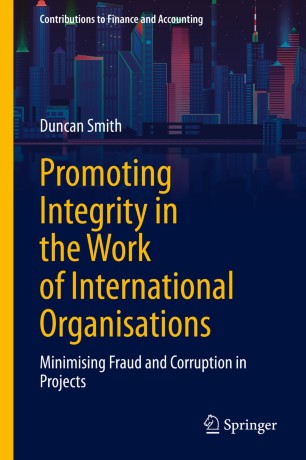
Minimising Fraud and Corruption in Projects
Authors: Smith, Duncan https://www.springer.com/gp/book/9783030739157#aboutBook
Recently published, this book is an in-depth study of how to promote integrity and avoid fraud & corruption in the work of international organisations, in particular multilateral development banks, such as the European Investment Bank, World Bank, Asian/Inter-American/African Development Banks and European Bank for Reconstruction and Development. A number of issues are reviewed, including procurement, compliance, corporate governance, business ethics, anti-money laundering and a number of relevant case studies highlighted. In addition, effective methods and tools of prevention, proactive monitoring and detection are reviewed and, if misconduct is identified, sanctioning the perpetrators of such misconduct is discussed.
The author hopes that raising awareness of integrity issues will lead to greater understanding of the issues and less fraud and corruption in the future. The book is aimed at practitioners, interested parties who monitor projects, as well as students (of law, accountancy, ethics, procurement, compliance & governance).
Duncan Smith is the Deputy Head of Fraud Investigations at the European Investment Bank in Luxembourg. He is currently responsible for policy, outreach, training and sanctions. He has undertaken many investigations and resolved numerous high-profile cases. Duncan previously worked in a similar role at the World Bank Investigations Unit in Washington DC and has been a member of the Secretariat of the Conference for International Investigators from 2001-17; he is a qualified barrister and prior to his international career, he worked in London at the DTI and Serious Fraud Office.
Duncan has given presentations to many different audiences including students, practitioners and others at the Sorbonne and Cambridge Universities, ECB, OECD, American & International Bar Associations and the Institute of Advanced Legal Studies. Duncan is donating proceeds that he receives from Springer from sales of the book to charity, in particular Headway (https://www.headway.org.uk/) which is a UK-based charity providing lots of very useful information on brain injury.
For questions or comments, contact the Secretariat at cii2025@aiib.org
Copyright © 2025 | Conference of International Investigators
Six volumes of General Principles for conducting core investigative activities that greatly expand on the principles within the CII’s Uniform Principles and Guidelines for Investigations. Endorsed at the 21st CII, these Principles provide more in-depth, principles-based, uniform guidance to investigators and Investigative Offices conducting these six core activities: Intake and Evaluation, Scoping and Planning, collection of Physical and Documentary Evidence, collection of Testimonial Evidence, collection of Digital Evidence and Evidence Analysis and Reporting of Findings.
As supplements to the CII’s Uniform Principles and Guidelines, each paper sets out non-binding principles establishing uniform standards to guide investigators and Investigative Offices undertaking these activities. They are purposely not prescriptive in technical details nor implementing practices. These Principles will also form the basis for a future CII Investigator Credential and CII Investigator training pathways.